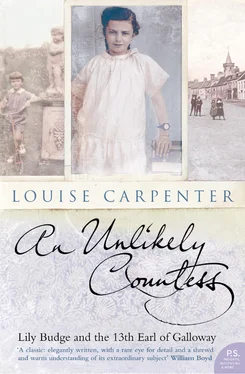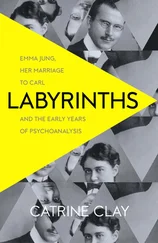In 1942 the town changed shape again. Two thousand soldiers from the First Polish Armoured Division arrived and were placed in another camp on the edge of the town. The Poles were every bit as alluring as the woodcutters. As they drove their tanks through the town, the officers played to the crowd. The dances continued at the town hall, but with blacked-out windows, and when the women passed them in the streets, all giggles and sly looks, the troops bowed and clicked their heels and made to kiss their hands. Some of the officers wore hairnets after washing their hair, and their cologne was considered very avant-garde. The women, particularly those who were single, gasped and swooned. While all this was unfolding, the older Duns men such as Papa, who were protective and even a mite jealous of the soldiers’ hold over the town’s women, sat around grumbling about how the tanks were smashing up their pavements.
At some stage during the war, certainly after Andrew’s birth, Lily fell ill. Doctors suspected that she had contracted tuberculosis. She was isolated immediately (no doubt to Jock’s infinite relief) in Gordon hospital, where she remained for five months, beset by self-pity. Brebner and Andrew went to live with Sis. It is perfectly true that for a young woman Lily had experienced a good deal of bad luck when it came to her health, but it must be stated that she applied a degree of drama to her suffering that would not have gone amiss in one of Mr Thomson’s school productions. In fact as an adult woman she had lost none of her childhood propensity for dramatising and displays of heightened emotion. So far as her health was concerned, her exaggerated sense of pain had started around the time of menstruation and developed to such a pitch that even Brebner, a four-year-old boy, dreaded her monthly cycle and the attendant crushing headaches of which she complained.
This latest health setback provided Sis with ample opportunity to get back into battle position and resume her recently challenged rule over her daughter’s life. When matron eventually returned Lily home, Lily was ill-equipped to fight Sis’s declaration that she was not physically fit enough to cope with her children and the stress of Jock. There was an element of truth in this. Lily would not allow Brebner to be taken from her – her bond with him was as intense as ever – but she acquiesced on the matter of Andrew. She told herself it was temporary. But the moment Andrew stepped out of her door and into Sis’s house, temporary became permanent. He never went back.
Randolph, about to turn eleven, had been a pupil at Belhaven for two years when war was declared. At first the school made only a few adjustments. Lights were lowered and the classroom windows were blacked out with heavy curtains. But there was another change, less perceptible to the human eye. The ethos of the school, with its severe and unbending determination to turn privileged young boys, soft and fresh from the nursery, into hard young men ready for such military schools as Harrow, strengthened further still. Mr Simms, the headmaster, made use of the icy winter weather by throwing open classroom windows during lessons. Often, the temperature dropped so severely that the boys could not help but plead for reprieve, to which Mr Simms would shout back, ‘Fusspots! If you enter the army or navy, you’ll have oodles of fresh air to contend with, no matter how cold you are!’
There were other tests of character too, which had been in place long before Chamberlain delivered his speech to the nation. Bathing, for instance, if such a word can be applied to something approaching such torture, occurred at seven every morning, when Mr Simms would walk up and down the bathrooms issuing orders to the boys to jump into baths of icy Dunbar mains water. There followed prayers and early morning drill, now laden with extra significance. The school was divided into patrols: Lions, Wolves, Woodpeckers, and Owls. Each patrol would be instructed to jump up and down, arms swinging forwards and back, up and down, and over the shoulder. There were punishments, of course, which Mr Simms liked to deliver with one of two slippers, made all the more sinister for him having christened them with childish names. ‘White Tim’ was a large rubber sports shoe he kept in the junior classroom cupboard, whereas ‘Painful Peter’ was another rubber slipper but much smaller, enabling him to carry it round in the pocket of his plus fours. Boys were constantly being thrashed over desks and tables, and their first beating was ceremoniously referred to as ‘Father’s Hand’. It was not long before Randolph received that baptism.
Randolph was probably the most unpopular, most peculiar, unhappiest little boy who had ever had the misfortune to set foot in the school. It’s hard to know what came first – his queer and disjointed ways, or Mr Simms’s reign of terror and his clear disgust at having to deal with such an odd, unresponsive and seemingly backward child. Whichever way round it was, each fed the other. The more unsettled Randolph became, the stranger he appeared to his peers, and consequently the more he was loathed. Randolph’s strangeness had its foundations in his insecurity and profound inferiority complex, but also in a certain arrogance that came from being his father’s son. Paradoxically, it would be the understanding of his birthright and its privileges that would eventually pit him first against his father, and then against the lawyers seeking to deprive him of them. Given how his personality would develop, Randolph’s greatest misfortune was to be born to a family of such achievements and to a world that expected so much of him. And yet he understood that this made him special. He was trapped between liking himself too much and too little.
Randolph admits that his behaviour in the years leading up to the terrifying, barbaric medical act performed on him as a young man, a last resort to bring about a change in him, was ‘bolshy and obstructive’. He was, he remembers, prone to alarming his peers by ‘running madly around in circles and falling down in a crazily bizarre manner, and uttering the most idiotic of monosyllables [ sic ]’. He was always crying and showing off, trying to get attention, which earned him the nickname of ‘a baby, a babe, a bub, or a booby’. He also continued making what he called ‘bare-bottomed noises’, so that he was regularly making the dormitory reek and infuriating matron, who would enter and ask the boys, ‘Somebody is needing a dose, Garlies, is it you? Are you stinking?’
Randolph had no friends. Not only was he considered anti-social and rather disgusting by the other boys, he also seemed to possess no particular talents, not for sport, nor patrol, nor academia. During patrol, for example – Randolph was an Owl – he flailed about at the back so that in the end Mr Spurgin, the Owls’ drill master, had to move him to the front, so ‘he could … deal with me when I failed to live up to expectations’. His academic failings hit Lord Galloway particularly hard. On one paper, Mr Simms scrawled in red pen, ‘Lack of vocabulary makes you write nonsense!’ and, as even Randolph saw, ‘Mr Sims [ sic ] had no use for people who wrote nonsense in translation of Latin prose or History essay questions.’
Randolph did nothing to help himself. Believing that everybody around him burnt with hatred, he went out of his way to intensify those feelings, sinking into a well of self-pity and playing up to the part of school oddball. There was nobody to whom he could turn. He thought Mr Simms a bully and a sadist (the present headmaster, Mr Michael Osborne, an old boy, remembers him as ‘a daunting dome-headed bald figure, more austere than an ogre’); Miss Simms, Mr Simms’s spinster sister, who strode around in a milky coffee-coloured tunic with matching hat and feather, was guilty by association; even the maids ‘possessed a severity that would freeze the softest hearts’. On one occasion, when his turn arrived to see the school doctor, who at the beginning of every term set up his examination bed in Mr Simms’s study, he mounted such violent protest that he was dragged screaming and kicking like a wild cat by four boys holding his ankles and wrists. During school prayers he mumbled obscenities and made silly noises. Sometimes he giggled so maniacally and with so little apparent provocation that Mr Simms shouted at him in front of the other boys, ‘Garlies, don’t behave like a lunatic!’
Читать дальше












